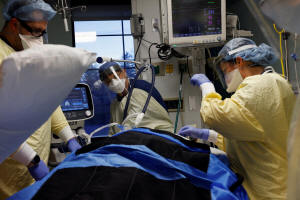Omicron surge pushes U.S. COVID hospitalizations toward record high
 Send a link to a friend
Send a link to a friend
 [January 08, 2022]
By Maria Caspani and Shannon Stapleton [January 08, 2022]
By Maria Caspani and Shannon Stapleton
NEW YORK (Reuters) - COVID-19
hospitalizations in the United States are poised to hit a new high as
early as Friday, according to a Reuters tally, surpassing the record set
in January of last year as the highly contagious Omicron variant fuels a
surge in infections.
Hospitalizations have increased steadily since late December as Omicron
quickly overtook Delta as the dominant coronavirus variant in the United
States, although experts say Omicron will likely prove less deadly than
prior iterations.
Health officials have nevertheless warned that the sheer number of
infections caused by Omicron was placing a strain on hospitals, some of
which are struggling to keep up with the influx of patients because
their own workers are out sick.
"It's sort of like medical throughput gridlock," Dr. Peter Dillon, the
chief clinical officer at Penn State Health in Pennsylvania, said in an
interview. "There (are) so many forces now contributing to the
challenges and I think there's an element, I don't want to say despair,
but of fatigue."
The United States reported 662,000 new COVID-19 cases on Thursday, the
fourth highest daily U.S. total, just three days after a record of
nearly 1 million cases was hit, according to the Reuters tally.
U.S. COVID hospitalizations approached 123,000, appearing poised to top
the record above 132,000, according to the tally. Deaths, a lagging
indicator, remain fairly steady at about 1,400 a day, well below last
year's peak.

Hospitalization data, however, often does not differentiate between
people admitted for COVID-19 and so-called incidental cases involving
people who were admitted for other reasons and were found to be infected
during routine testing.
In New York 42% of patients hospitalized with COVID-19 were in the
incidental category, Governor Kathy Hochul told a briefing on Friday, a
sign of how the data may not be giving the clearest picture of Omicron's
impact in terms of severe disease.
While hospitalizations continue to rise in New York, Hochul and other
state officials expressed optimism that the worst of the Omicron wave
could pass in the coming days.
"We need a couple more days to be able to tell that it has peaked," said
Dr. Mary Bassett, New York's acting Health Commissioner. "I think that
we can expect a difficult January but that things should be much better
by February."

[to top of second column]
|

Medical staff treat a coronavirus disease (COVID-19) patient in
their isolation room on the Intensive Care Unit (ICU) at Western
Reserve Hospital in Cuyahoga Falls, Ohio, U.S., January 4, 2022.
REUTERS/Shannon Stapleton
 STAFF EXHAUSTION
Rising cases have forced hospital systems in nearly half of U.S.
states to postpone elective surgeries, a reflection of the strain on
the healthcare sector, which lost about 3,100 workers according to
Friday's U.S. monthly employment report.
Some doctors and nurses expressed frustration at the surge among
unvaccinated patients, saying they could not understand why someone
would ignore a doctor's advice to get vaccinated but then seek a
medical professional's help once sick with COVID-19.
"A lot of this is unnecessary death," said Lynne Kokoczka, a
clinical nurse specialist in an intensive care unit at the Cleveland
Clinic in Ohio shortly after she helped remove a dead COVID-19
patient from the ward.
Ninety percent of the patients in intensive care on mechanical
ventilation at the Cleveland Clinic are unvaccinated, said Dr.
Hassan Khouli, chairman for the department of critical care medicine
at the academic medical center.
"This is really taking a toll on our teams," Khouli said. "Burnout
is a major concern."
While many school systems have vowed to continue in-person
instruction, some have faced closures as cases rise. In Chicago -
the third-largest U.S. public school system - schools were closed
for a third day on Friday amid a teacher walkout over COVID-19
protections.
Officials continue to press vaccinations as the best protection
against serious illness, although federal mandates requiring them
have become politically contentious.
In a closely watched legal test of mandates, conservative U.S.
Supreme Court justices on Friday questioned President Joe Biden's
vaccine-or-testing requirement for large businesses but appeared
more receptive to a mandate for healthcare facilities at a time of
surging COVID-19 infections.

U.S. staff of Citigroup Inc who have not been vaccinated against
COVID-19 by Jan. 14 will be placed on unpaid leave and fired at the
end of the month unless they are granted a vaccine exemption, a
source told Reuters on Friday.
Hochul said New York would become the first state to mandate a
booster shot for healthcare workers, pending approval from a state
health planning council. She said the booster was needed to keep
nurses healthy and able to work.
(Reporting by Susan Heavey, Lisa Shumaker, Maria Caspani, Ankur
Banerjee, Shannon Stapleton, Andrew Hay and Nathan Layne; Editing by
Jonathan Oatis and Bill Berkrot)
[© 2022 Thomson Reuters. All rights
reserved.] This material may not be published,
broadcast, rewritten or redistributed.
Thompson Reuters is solely responsible for this content. |